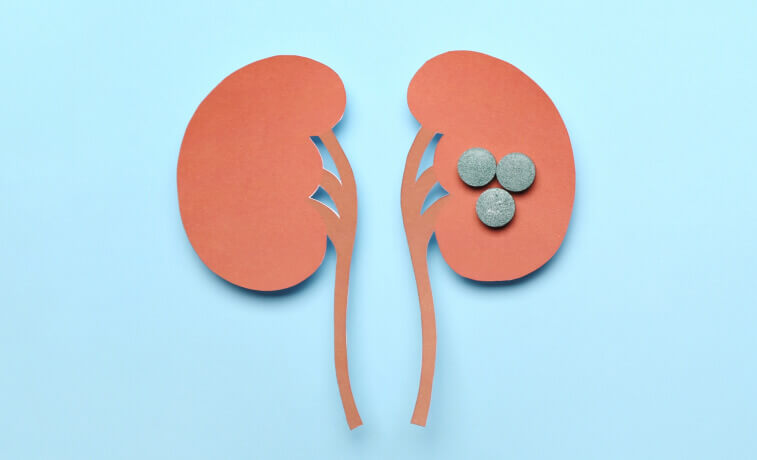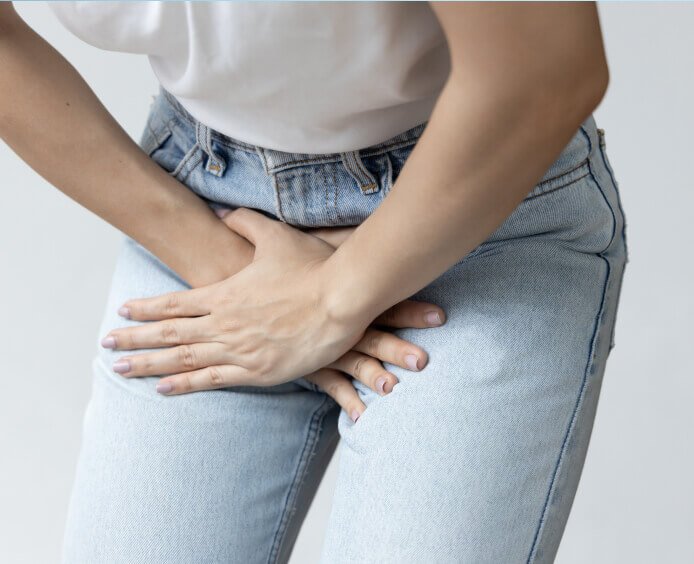Kidney Stones
Kidney stones are a common health concern affecting around 2-3% of the population globally. They can range in size – from as small as a grain of sand to as big as a golf ball. While small stones can pass without medical treatment, larger ones may require kidney stone removal treatments, such as surgery, to prevent blocking the flow of urine.


What Are Kidney Stones?
Kidney stones are hard deposits made of minerals and salts that form inside the kidneys when urine becomes concentrated, allowing minerals to crystallise and clump together. These stones can form due to factors like diet, excess weight, medical conditions, and certain medications. Having this condition can be a painful and uncomfortable ordeal. Kidney stones are more common among older men, but reports of women contracting this condition are increasing nowadays. Thankfully, there are several treatment options that are readily available.
Here at our kidney clinic, we specialise in the diagnosis and treatment of kidney stones; on top of a wide range of treatment services for disorders and diseases concerning the urological system.
What Are the Signs & Symptoms of Kidney Stones?
Kidney stones vary in size. Some are so small that they do not cause any symptoms and can be passed naturally out of the body through the urine.
Others are larger and may cause a blockage in the ureter, interrupting the normal flow of urine. In such cases, the following kidney stone symptoms may be experienced:










What Causes Kidney Stones?
If you are experiencing most of the symptoms listed above, then you most likely have kidney stones. However, what could have caused it?
Also known as Renal Calculus, this condition usually occurs when normal chemicals in urine that typically prevent this condition, have stopped working. Moreover, your diet plays a large part in the situation – what you eat and drink may actually cause the formation of stones in your bladder and kidneys.








What Are The Different Types of Kidney Stones?
Calcium Oxalate
Uric Acid
Struvite
Cystine
How Are Kidney Stones Diagnosed?

Blood Testing
Urine Testing
Image Testing
How to Prevent Kidney Stones Formation
Drinking enough fluids is a primary preventive method. Doctors recommend drinking enough fluids to pass about 2.5 litres of urine a day. Doing so can help urine to be less concentrated and reduce the risks of kidney stone formation.
It is also good to reduce the amount of salt in your diet as this can lead to high levels of urine calcium and cystine. High-sodium food, including cheese, processed meats, frozen and canned food, and certain condiments should also be avoided. Another preventive measure is having calcium-rich foods such as non-dairy milks and products in your diet plan as these do not contribute to the formation of kidney stones. However, calcium supplements do increase your risk of kidney stones, so intake should be carefully regulated. Eating fruits and vegetables rich in potassium and fibre can help reduce the formation of kidney stones. You should also manage eating foods with high levels of oxalate like chocolates, spinach, black pepper and soy products.
Maintaining a healthy weight can be a preventive factor, but seek advice from your healthcare provider for a proper diet plan as high-protein and crash diets can cause kidney stones.
What Are the Available Treatments for Kidney Stones?
Kidney stones treatment will depend on the type of stone and the severity of the symptoms. If you have detected them early while they are still small, you can simply drink more water, more regularly. This is usually enough to get rid of them naturally.
However, if the stones are already too large to pass naturally, its treatment will then involve breaking them down into smaller pieces or removing them via kidney stone surgery by your kidney specialist. Here are several treatments employed to remove them:
Extracorporeal Shock Wave Lithotripsy
Retrograde Intrarenal Surgery
Percutaneous Nephrolithotomy
Laparoscopy
Laser Lithotripsy
The treatment of kidney stones is one of the services offered by our kidney clinic. We also offer other specialised urology services and treatments including ESWL, retrograde intrarenal surgery, and laparoscopy.
If you suspect that you are suffering from this condition and it is affecting your day-to-day activities, do give us a call or set an appointment with kidney stones doctor, Dr Michael Wong at +65 6838 1212 today.

What Are the First Signs of Passing a Kidney Stone?

Blood in the urine

Frequent urination

Difficulty in voiding

Painful urination

Nausea or vomiting

Fever, chills or sweating

Sharp pain in the lower back and lower abdomen
What Is the Best Way to Relieve Kidney Stone Pain?
In some suitable cases, kidney stone doctors may prescribe pain medication and alpha-blockers for faster passage of stones. In cases of severe pain or obstruction, your doctor may perform certain procedures to either break down the stone into smaller parts to be passed out from the body or to extract larger stones.
An example of a kidney stone surgery is a ureteroscopy, which involves passing a small telescope through the bladder and ureter to locate and remove the stones.
our kidney stones specialist, to provide the care you need.
How Long Does Kidney Stone Pain Last?
Will the Stones Go Away Without Any Kidney Stones Treatment?
Location
Mount Elizabeth Medical Centre,
Singapore 228510
Number
| Tel | |
| Tel | |
| Fax | : (65) 6838 1216 |
| 24-hour answering service |
Address
Hours
Mon-Fri | : 9:00am - 1:00pm 2:00pm - 5:00pm |
Sat | : 9:00am - 12:00pm |
Sun/PH | : Closed |





